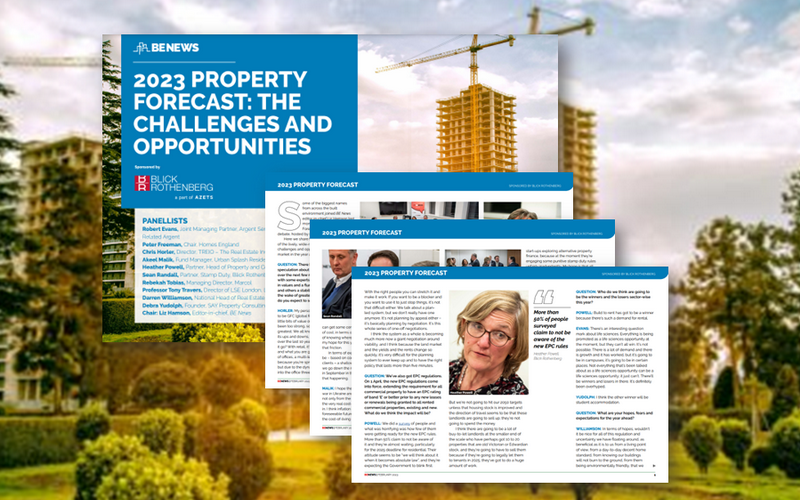Non-Resident Landlords in the Corporation Tax Era
Changes to the non-resident landlord rules were proposed in Finance Act 2019, and subsequently came into force on 6 April 2020, Now in 2023, with an increased Corporation Tax rate of 25% in force, the potential impact of the Corporate Interest Restriction (CIR) rules are beginning to take effect
Non-Resident Landlords in the Corporation Tax Era
Historically, non-UK tax resident companies were subject to Income Tax on rental profits arising from their UK property. To ensure consistency of tax treatment between UK resident corporate landlords and their offshore counterparts, changes to the non-resident landlord rules were proposed in Finance Act 2019, and subsequently came into force on 6 April 2020.

Now in 2023, with an increased Corporation Tax rate of 25% in force, the potential impact of the Corporate Interest Restriction (CIR) rules are beginning to take effect. Additional complications arising from the hybrid mismatch rules, as well as possible interest restrictions being imposed on late paid interest, i.e., where interest is not paid within 12 months of the year end to certain connected recipients could also impact the tax payable on your rental profits. Accordingly, understanding the complexities of the UK corporate tax system is key to ensuring your business remains tax efficient in these turbulent times.
Interest Restrictions
Finance costs had always been eligible for tax relief against rental profits to the extent that they were incurred wholly and exclusively for the property business, and the finance was arranged under arm’s length terms.
On 6 April 2020, following recommendations proposed by the OECD under BEPS Action 4, the UK Government introduced the CIR rules that impose a restriction on the amount of interest that companies can obtain tax relief for against their profits. Broadly, these rules limit the amount of tax relief available on finance costs to 30% of ‘Tax EBITDA’, however, there is a de minimis (across companies in a group that are subject to UK Corporation Tax) of £2 million. It is possible to use the group ratio method or public infrastructure exemption (if applicable) if it provides a better result. With the increased cost of finance, these rules could significantly impact the amount of Corporation Tax ultimately falling due to HM Revenue & Customs (HMRC).
Hybrid Mismatches
Another recommendation proposed by the OECD under BEPS Action 2 was in relation to hybrid instruments. These rules were enshrined into UK tax law and came into force on 1 January 2017 and are applicable to corporate non-resident landlords from 6 April 2020.
These complex rules are aimed at counteracting tax mismatches where the same item of expenditure is deductible in more than one jurisdiction, or where expenditure is deductible in one jurisdiction, however, the corresponding income is not fully taxable (or the income is taxed at a beneficial rate or is deferred to a future period) in the secondary jurisdiction. An unfortunate consequence of these rules is that they are mechanical in operation and do not contain a purpose test. They can therefore apply to wholly commercial transactions. As such, these rules can seek to deny interest relief completely, where a non-resident corporate landlord is paying interest to a related party in circumstances where as a result of the way that different countries treat certain entities or instruments under their domestic tax law, the recipient is not subject to tax on the receipt.
Losses
With corporate non-UK tax resident landlords being absorbed into the UK corporate tax net, those companies will also be subject to the corporate loss restriction. These rules impose a 50% restriction on the amount of profits over £5m (the deductions allowance) against which most carried-forward losses may be relieved. The £5 million ‘de minimis’ applies to income losses and capital losses in aggregate, and on a group basis. Existing unutilised Income Tax losses of a company will be available for carry forward and offset against future UK property business profits of that company, without restriction. However, those losses will not be available for offset against other types of income or to be surrendered as group relief.
Annual Compliance Requirements
Overseas companies that are seeking to acquire UK property and ultimately generate rental profits will be required to register with HMRC and obtain a Unique Tax Reference (UTR). These companies will be subject to annual compliance and filing obligations with HMRC. Further, should the company fall within the CIR rules outlined above, there may be a requirement for appointing a reporting company for corporation interest restriction filings.
Companies within the UK corporate tax net are required to complete and file company tax returns and tax computations with HMRC within 12 months of the end of the accounting period. Accounts must also be prepared and accompany the tax computation and return. HMRC have now confirmed that they are willing to accept a simple profit and loss account together with a supporting balance sheet, as opposed to full statutory accounts.
Any Corporation Tax falling due to HMRC is normally due nine months and one day following the end of the accounting period that generated the rental profits. For subsequent periods, tax payment dates will depend on the size of the company (by profitability). If the profits for an accounting period are more than £1.5 million (reduced proportionally for the 51% group companies or associated companies – those under common control, and the length of the accounting period if less than 12 months), the Corporation Tax payment date will be accelerated. Under the quarterly instalment payment (QIP) regime, up to four instalment payments may be required, with two falling within the accounting year and two following the year end. For example, a December 2024 year end within the QIP regime would have the following payment dates: 14 July 2024, 14 October 2024, 14 January 2025 and 14 April 2025.
Where there are other companies in the group which are within the scope of UK Corporation Tax, it may be possible to enter into a ‘group payment arrangement’. One of the companies is nominated to make the payments on behalf of all the companies within the arrangement.
Withholding Tax Requirements
Historically, under the ‘Non-Resident Landlord’ (NRL) scheme, if approval from HMRC for the NRL to receive rental income gross had not been applied for and confirmed by them, the letting agent (or tenant) was required to calculate the tax due at 20% and pay it to HMRC on a quarterly basis. In the UK corporate tax sphere, this scheme will continue to apply, with the rate of withholding tax at 20%, notwithstanding that corporate NRLs will be subject to Corporation Tax at 25%. To the extent that the 20% withholding exceeds their Corporation Tax liability in respect of their net rental income the company will be eligible to reclaim any overpaid tax.
Final Thoughts
While the intention to align UK and non-UK corporate landlords under the umbrella of the UK’s corporate tax regime is wholly equitable, the UK’s Corporation Tax regime is mired with complexities that can result in unforeseen tax liabilities without due care and attention.
Would you like to know more?
If you would like to discuss any of the above in more detail, please get in touch with your usual Blick Rothenberg contact, or Anil using the form below.
Contact Us

You may also be interested in

2023 Property Forecast: The Challenges & Opportunities

Getting the VAT wrong on a property deal













